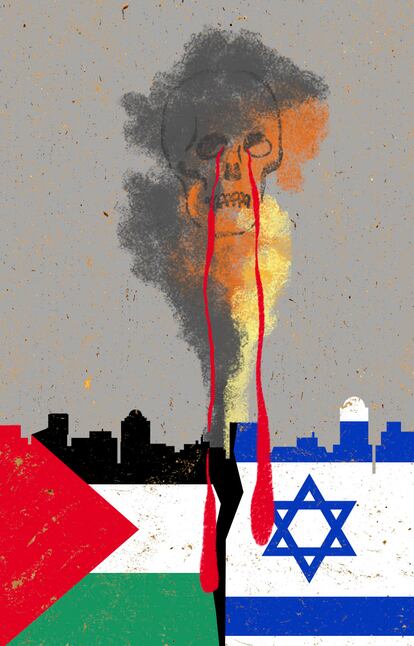How do we talk about Israel?
There are many ways to comment on the attack carried out by Hamas, but one thing is certain: we have never seen this before and there is no way to imagine its consequences

There are many ways to talk about what happened last Saturday, when Hamas began a terrorist attack against Israel that sparked a new war and led us to a world more broken than the broken world we already live in. There are many ways to talk about it, I say, but one thing is certain: we have never seen this before, and there is no way to imagine the consequences it will have.
When I say that we have never seen it before, I am referring to our new world of cameras in our pockets and live-streaming, which has put us in the midst of unfiltered horror: the horror of families with children who were kidnapped amid screams and fear, the horror of the militiamen who entered populated places and took lives indiscriminately — we have gotten used to the adverb — the horror of the young people running through sandy fields to escape the attacks and call their parents to tell them that something is not right. A video shows a white pickup truck entering the city of Sderot — it has a machine gun mounted on the back — and then the dead bodies of those waiting for the bus at a stop. Another video shows a family shot inside their car (a woman, a father who had managed to get out, a son or daughter).
And when I say there is no way to imagine what is to come, I am thinking of the evidence that this war is not just between Israel and Hamas. Those who know more about the subject had already pointed out that the sophistication of the attack, its wealth of resources and its patient organization, are unthinkable without the help of Tehran. And that, which seems so obvious to so many, would throw the region into a state of unusual and unpredictable tension. There is no way to know what this Iranian involvement in the bloodiest attack in Israel’s recent history will entail. Nor is it possible to forget that Putin’s war against Ukraine has been waged for a long time with Iranian drones, because those paths will lead us to uncertain destinations. It is not possible to ignore the fact that in this new war, Israel will need military aid, and that help will come from the United States, just as the aid that prevented Israel’s defeat in the Yom Kippur War half a century ago came from the United States. But what does that mean?
For now, a collateral victim of Hamas’s attack on Israel is Ukraine, since the fronts that the United States can keep open are not unlimited. It is not only a question of weapons: in our cruel economy of attention, in our exhausted lives whose capacity to take on the pain of others is limited, nothing worse could happen to the Ukrainian efforts to communicate their tragedy than the appearance on the world stage of a new tragedy. In recent months, much has been written about what is now called a multipolar world, the competition of small actors eager to take some of the power that the big hitters have lost, and this is also how we can talk about the new war: as one more test that the new world order that emerged after 1945 — incidentally, the creation of Israel in 1948 is part of that order — has unraveled in several places. But this conversation is geopolitical, and I have always had the impression that to talk like this is to leave out many important things: history, with all its cruel lessons about the moment when what is happening now was sown; language, which suffers every day in times of war; and, above all, the people, whose bodies suffer violence. Is there room in our conversation to talk about all that? We must try to make it so. Because only in this way, speaking of the individual suffering of human beings, can we respond to statements such as those made by Colombian President Gustavo Petro, who, after advocating dialogue (and that is good but empty), has been incapable of condemning the attacks, has resuscitated them, and has equated Gaza with Auschwitz.
In any case, those of us who have followed the history of this large war made up of small wars have inevitably remembered what happened in October 1973, when Egypt and Syria chose the Yom Kippur holiday to attack Israel. This time it was the festival of Sukkot. When this attack began, when the Israelis on the border saw the first rockets light up the early morning sky, 50 years and a few hours had passed since Yom Kippur, and it is inconceivable that the Israeli forces had not even taken precautions for the anniversary — everyone knows that fanatics like anniversaries, and intelligence services take more precautions when certain dates approach. But that is where the similarities end: back then it was a conventional war between two conventional enemies, a war between armies and states. This weekend’s attack on civilians, cruel and cowardly, makes us think more of September 11, 2001. Except for the novel and terrifying element of kidnapping. And that changes everything.
The kidnapping of more than 100 Israeli citizens, children and adolescents among them, who are now tokens for prisoner exchange or tools for terrorist blackmail, distinguishes this war from those that have preceded it. Hamas had never dared to do that, or, if it had ever contemplated it, had never managed to carry it out. In 2011, Benjamin Netanyahu exchanged a kidnapped Israeli soldier for more than a thousand Palestinian prisoners. Now there are many more kidnapped people, and they can and will also be used as human shields, and that makes life considerably difficult for Netanyahu, a leader whom a large part of Israel’s population considers undesirable. Not only that: as far as I have been able to confirm, a good number of the Israeli public blame him for the security catastrophe that has just occurred. Too busy subverting his country’s democracy by attempting real coups against the judiciary, Netanyahu did not measure (because he has never wanted to measure) the effect that the division, polarization, and confrontation that he himself has sown would have on his society. For months, it seemed, senior military commanders had warned him that social and political divisions were projecting an image of fragility that his enemies would take advantage of. Many reservists, as reported here in July, were rebelling against the authoritarianism of their government and its attacks on democracy.
An article in Le Monde talks about the videos that Hamas has proudly published: Israeli children kidnapped and surrounded by Palestinian children who harass them; an 85-year-old woman, surrounded by her captors, smiling in her senility and apparently unaware of the danger she was in. Every Israeli, regardless of age, sex, or origin, has become a military target of Hamas, and Saturday’s attacks are the most obvious embodiment of that horrific deterioration in relations. But then the Israeli Defense Minister has appeared, calling the Palestinians “human animals,” and we can venture that this war will sow the seeds of future attacks. The horror that we now see comes from a long time ago, and only foreshadows a degradation in the situation. As long as there is no two-state solution, there is no reason to think that one day the atrocities will end.
Sign up for our weekly newsletter to get more English-language news coverage from EL PAÍS USA Edition
Tu suscripción se está usando en otro dispositivo
¿Quieres añadir otro usuario a tu suscripción?
Si continúas leyendo en este dispositivo, no se podrá leer en el otro.
FlechaTu suscripción se está usando en otro dispositivo y solo puedes acceder a EL PAÍS desde un dispositivo a la vez.
Si quieres compartir tu cuenta, cambia tu suscripción a la modalidad Premium, así podrás añadir otro usuario. Cada uno accederá con su propia cuenta de email, lo que os permitirá personalizar vuestra experiencia en EL PAÍS.
¿Tienes una suscripción de empresa? Accede aquí para contratar más cuentas.
En el caso de no saber quién está usando tu cuenta, te recomendamos cambiar tu contraseña aquí.
Si decides continuar compartiendo tu cuenta, este mensaje se mostrará en tu dispositivo y en el de la otra persona que está usando tu cuenta de forma indefinida, afectando a tu experiencia de lectura. Puedes consultar aquí los términos y condiciones de la suscripción digital.









































